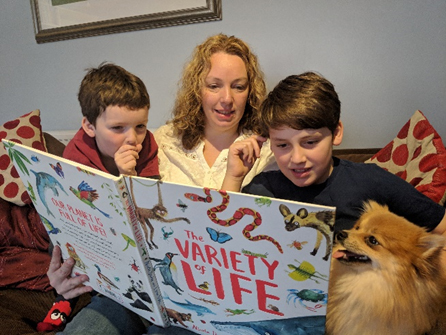2 Choice and agency at home
A key feature of children’s reading at home is the potential for choice and agency. Much of their home reading is not timetabled, hence there is greater scope to sustain reading that is highly engaging with no requirement to continue reading when they have lost interest. Home environments offer comfy spaces for reading; children might read in bed, lying on the floor, hanging off the end of the sofa, or snuggled up with a parent or grandparent. Moreover, they are not confined to one space, they can move and change position at will. Whilst it is difficult to replicate these exact spaces in the classroom environment, it is important to recognise that place and space are crucial aspects of the affective dimensions of reading and to consider adapting your school environment as discussed in Session 6, Section 6.

Choice of reading materials for children at home is a complex issue. Some homes are filled with a wide range of reading materials and children may have access to texts that they would not necessarily encounter at school. For example, texts available in bi-lingual / multi-lingual households offer more choice and enable children the opportunity to read in their mother tongue.
The internet also widens the choice of reading materials for older children. With information at their fingertips, they can spontaneously explore a topic of interest through a search engine; finding information about a celebrity or a new video game, for instance. Fanfiction (fictional writing authored by fans of an existing work of fiction, such as Harry Potter or Star Wars) is an increasingly popular genre which is exclusively available online and varies in length from a few paragraphs to entire novels. A study for the National Literacy Trust (Picton, Clark and Judge, 2020) found that four out of five teenagers who play video games, read related materials, such as in-game communications, reviews, blogs, books and fan fiction. These sorts of highly motivating texts are not usually encouraged in school.
However, not all children have equal access to reading materials, nor technology and the internet and so schools, libraries and educators have a crucial role to play in providing access to a wide range of texts. Indeed, many school libraries and classroom bookshelves include a different genre, such as comics, magazines and digital texts, as well as books. Educators also play a vital role in widening children’s repertoires, which is why getting to know children as readers and learning about families’ reading practices is so important.
